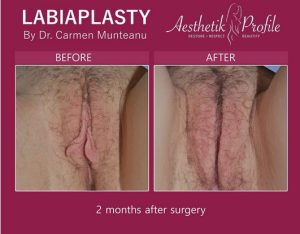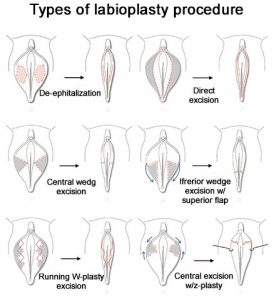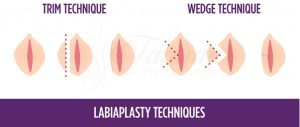
Congratulations on reaching the four-week mark after your labiaplasty procedure!
In this article, we will explore the progress and changes you can expect to experience at this stage.
Whether you’re seeking reassurance or looking for information to prepare for your own surgery, we’ve got you covered.
So, sit back, relax, and let’s take a friendly and informative journey through the world of labiaplasty after four weeks.
Recovery Process
Recovering from labiaplasty surgery is a gradual process that requires patience and proper care.
The healing timeline can vary from person to person, but there are some general stages that most individuals go through.
In the initial days and weeks following surgery, it is important to focus on rest and allowing your body to heal.
As time goes on, you can gradually resume normal activities, manage pain, and monitor any signs of infection.
Overview of the Healing Timeline
The healing timeline for labiaplasty can depend on several factors, including your body’s natural healing ability and the specific technique used during surgery.
Generally, the first week after surgery is the most critical for healing.
During this time, you may experience discomfort, swelling, and bruising in the surgical area.
It is important to follow your surgeon’s post-operative instructions carefully and avoid any strenuous activities that could disrupt the healing process.
Resuming Normal Activities
After about two weeks, you may be able to gradually resume normal activities.
However, it is important to listen to your body and not push yourself too hard.
Activities that involve excessive stretching or straining should be avoided until you have fully recovered.
It is always best to consult with your surgeon before resuming any physical activities or exercise routines.
Pain Management
Pain and discomfort are normal after any surgical procedure, including labiaplasty.
Your surgeon will likely prescribe pain medication to help manage any post-operative pain.
Additionally, applying ice packs to the surgical area can help reduce swelling and alleviate discomfort.
However, it is important to avoid applying ice directly to the skin.
Instead, wrap the ice pack in a clean cloth before placing it on the surgical area.
Swelling and Bruising
Swelling and bruising are common side effects of labiaplasty surgery and can last for several weeks.
To reduce swelling, it is advised to keep the surgical area elevated whenever possible, especially during the first few days after surgery.
Wearing loose, comfortable clothing can also help alleviate discomfort and allow for better airflow to aid in the healing process.
It is important to avoid tight-fitting underwear or pants that may cause irritation or constrict blood flow.
Wound Care
Proper wound care is crucial to prevent infection and promote healing.
Your surgeon will provide specific instructions on how to care for your sutures and incisions.
It is essential to keep the surgical area clean and dry, avoiding any harsh soaps or cleansers that may irritate the delicate tissue.
Your surgeon may also recommend applying an antibiotic ointment to the incisions to prevent infection.
You should also avoid swimming or soaking in water, such as bathtubs or hot tubs, until your surgeon gives you the green light.
Monitoring for Infections
While infections after labiaplasty are rare, it is important to monitor the surgical area for any signs of infection.
These signs may include increased redness, swelling, warmth, discharge, or a foul odor.
If you notice any of these symptoms, it is crucial to contact your surgeon immediately.
Prompt treatment of an infection can prevent further complications and ensure a smooth recovery process.
Your surgeon will be able to evaluate your symptoms and prescribe appropriate treatment if necessary.

Physical Changes
After labiaplasty surgery, you can expect to experience several physical changes as your body heals and adjusts.
Understanding these changes can help alleviate any concerns and ensure you are prepared for the recovery process.
Reduced Swelling and Bruising
One of the most noticeable physical changes after labiaplasty is a reduction in swelling and bruising.
In the days and weeks following surgery, the initial swelling will gradually subside, and the surgical area will begin to take on a more natural appearance.
It is important to note that it may take several weeks or even months for the swelling to completely resolve, so patience is key during this stage.
Suture Dissolution
As part of the healing process, the sutures used during labiaplasty surgery will gradually dissolve on their own.
This typically occurs within a few weeks, but the exact timeline can vary for each individual.
Your surgeon may provide additional instructions on how to care for the dissolving sutures, such as avoiding activities that could put unnecessary stress on the area.
Initial Scarring
Scarring is a normal part of any surgical procedure, including labiaplasty.
Initially, the incision sites may appear red or raised, but over time, they will fade and flatten.
It is important to protect your incisions from excessive sun exposure during the early stages of healing, as sunlight can increase the visibility of scars.
Your surgeon may also recommend scar treatment options, such as silicone gels or sheets, to help minimize the appearance of scars.
Discomfort and Sensitivity
It is common to experience some discomfort and sensitivity in the surgical area during the healing process.
As the swelling subsides and the incisions heal, these symptoms should gradually improve.
However, it is important to avoid any activities or clothing that could cause unnecessary irritation or friction in the area.
If discomfort persists or worsens over time, it is important to consult with your surgeon for further evaluation.
Residual Swelling
While most of the swelling will resolve within the first few weeks after surgery, some individuals may experience residual swelling that can persist for several months.
This is especially common in cases where extensive tissue manipulation is required during surgery.
It is important to communicate any concerns or changes in swelling to your surgeon during follow-up appointments.

Sexual Activity and Intimacy
The decision to engage in sexual activity after labiaplasty should be made in consultation with your surgeon and based on your individual healing progress.
It is important to be patient and allow your body time to heal fully before resuming sexual activity.
Healing Progress for Sexual Engagement
It is crucial to wait until your surgeon has given you clearance before engaging in sexual activity.
This typically occurs once the surgical area has healed, and any residual swelling or discomfort has subsided.
Your surgeon will provide specific guidelines on when it is safe to resume sexual activity, taking into consideration your unique healing progress.
Intimacy Considerations
During the healing process, it is important to consider the potential impact of sexual activity on the surgical area.
Vigorous or rough intercourse can potentially disrupt the healing process and cause complications.
It is advisable to start with gentle and slow movements, gradually increasing intensity as tolerated.
Maintaining open and honest communication with your partner throughout the recovery period is essential to ensure a comfortable and safe experience for both individuals involved.
Resuming Sexual Activity
Once your surgeon has given you the go-ahead, you can consider resuming sexual activity.
However, it is important to listen to your body and stop if you experience any pain, discomfort, or bleeding during or after sexual activity.
If you have any concerns or questions, it is always best to consult with your surgeon for guidance.
Lubrication and Moisturizing
During the recovery process, it is common for the surgical area to experience dryness and decreased natural lubrication.
Using a water-based lubricant can help minimize discomfort during sexual activity.
Additionally, maintaining proper hydration and moisturizing the surgical area with a gentle, non-irritating moisturizer or petroleum jelly can promote overall comfort.
Sensitivity Changes
It is normal for some individuals to experience changes in sensitivity following labiaplasty surgery.
Some may find that their sensitivity increases, while others may experience a temporary decrease in sensation.
These changes can be due to the surgical alterations and the healing process.
If you notice any significant or prolonged changes in sensitivity, it is important to discuss them with your surgeon during follow-up appointments.

Emotional and Psychological Recovery
Undergoing any surgical procedure can have emotional and psychological implications.
It is important to address these aspects of recovery to ensure a holistic and successful healing journey.
Body Image and Self-Perception
Labiaplasty surgery can bring about changes in an individual’s body image and self-perception.
While the decision to undergo the procedure is deeply personal, it is essential to have realistic expectations and understand that surgery is not a cure-all for body image concerns.
Remember that every individual is unique, and it is important to embrace and appreciate your body at every stage of the recovery process.
Managing Expectations
Managing expectations is a crucial aspect of emotional and psychological recovery.
While labiaplasty can lead to improved comfort and confidence, it is important to understand that the final results may take time to fully manifest.
It is helpful to have open and honest conversations with your surgeon about your expectations, concerns, and any apprehensions you may have.
This collaboration can ensure that you and your surgeon are on the same page, leading to better outcomes and a more positive recovery experience.
Support Systems
Having a strong support system in place can greatly aid in emotional and psychological recovery.
Reach out to supportive friends and family who can provide comfort, understanding, and encouragement throughout your healing journey.
Additionally, joining online support groups or patient forums can connect you with others who have gone through or are going through a similar experience, allowing you to share advice, ask questions, and find comfort in knowing you are not alone.
Psychological Counseling
If you find that the emotional and psychological impacts of surgery are significant or if you are struggling with body image concerns, it may be beneficial to seek professional counseling.
A trained psychologist or therapist can help you navigate through any emotional challenges and provide tools and strategies to promote self-acceptance and emotional well-being.
Post-Surgical Depression
It is not uncommon for individuals to experience post-surgical depression following any surgical procedure, including labiaplasty.
The hormonal changes, physical discomfort, and emotional adjustments can contribute to feelings of sadness or a temporary decrease in mood.
If you are experiencing prolonged or severe symptoms of depression, it is crucial to reach out to your surgeon or mental healthcare provider for support and guidance.

Follow-Up Appointments
Follow-up appointments are an essential component of the recovery process after labiaplasty surgery.
These appointments allow your surgeon to monitor your healing progress, address any concerns or complications, discuss the final results, and provide recommendations for long-term care.
Importance of Follow-Up Visits
Attending your scheduled follow-up visits is crucial to ensure that your healing process is on track and that any potential issues can be addressed promptly.
Your surgeon will evaluate the surgical site, monitor for any signs of complications, and assess how you are healing overall.
These appointments provide an opportunity for open communication, allowing you to ask questions and express any concerns you may have.
Evaluation of Healing Progress
During follow-up visits, your surgeon will closely evaluate the healing progress of your labiaplasty surgery.
They will assess factors such as swelling, bruising, sutures, incision site healing, and overall tissue quality.
Your surgeon will determine if any additional interventions or treatments are necessary, and provide you with a timeline for when you can expect to see the final results of your surgery.
Addressing Concerns or Complications
If you have any concerns or notice any changes in your healing process between scheduled follow-up visits, it is important to contact your surgeon’s office promptly.
Common concerns or complications after labiaplasty may include persistent pain, excessive bleeding, signs of infection, or any unexpected changes in appearance.
Your surgeon will be able to evaluate your situation and provide appropriate guidance or treatment.
Discussion of Final Results
As your healing progresses, your surgeon will discuss the final results of your labiaplasty surgery with you.
This discussion may include an evaluation of how closely the surgical outcome aligns with your initial goals and expectations.
If you are satisfied with the results, your surgeon may provide recommendations for maintaining the outcomes, such as proper hygiene, moisturizing, and avoiding irritants.
If there are any areas of dissatisfaction, it is important to communicate them openly with your surgeon, as they may be able to suggest additional options or strategies for improvement.
Long-Term Care Recommendations
During follow-up visits, your surgeon will provide you with long-term care recommendations to maintain the results of your labiaplasty surgery.
These recommendations may include keeping the surgical area clean and dry, avoiding irritants or harsh products, and maintaining overall vaginal health through regular medical examinations.
Following these recommendations can help ensure the longevity of your surgical outcomes and promote overall well-being.

Potential Complications
While labiaplasty is generally a safe procedure, like any surgical intervention, it carries certain risks.
It is important to be aware of potential complications and understand the steps you can take to minimize their occurrence or severity.
Common Post-Surgery Issues
Some common post-surgery issues after labiaplasty may include swelling, bruising, discomfort, and temporary changes in sensation.
These issues are generally mild and resolve on their own as the healing process progresses.
However, if you have any concerns or the symptoms worsen, it is important to consult with your surgeon for further evaluation.
Infection and Complications
Although rare, infection can occur after labiaplasty surgery.
It is crucial to monitor the surgical area for any signs of infection, such as increased redness, swelling, warmth, discharge, or a foul odor.
If you suspect an infection, it is important to contact your surgeon immediately for evaluation and treatment.
Timely intervention can prevent further complications and promote optimal healing.
Scarring and Adhesions
Scarring is a normal part of the healing process after labiaplasty.
While most scars fade and flatten over time, some individuals may develop hypertrophic or keloid scars, which are raised and thickened.
Your surgeon will provide specific instructions on scar care and may recommend additional treatments, such as silicone gels or sheets, to help minimize the appearance of scars.
Adhesions, which occur when the incision edges stick together, can also be a potential complication.
Your surgeon may gently separate any adhesions during follow-up visits to promote proper healing.
Hematoma or Seroma Formation
Hematoma or seroma formation can occur after labiaplasty surgery and involves the accumulation of blood or fluid under the skin.
These collections can cause swelling, and discomfort, and delay the healing process.
If you notice increased swelling or have concerns about fluid accumulation, it is important to consult with your surgeon for evaluation and management options.
Asymmetry or Uneven Appearance
While every effort is made to achieve symmetry and an aesthetically pleasing outcome, some degree of asymmetry is possible after labiaplasty surgery.
It is important to understand that perfect symmetry may not be achievable, and minor differences between the labia are normal and natural.
If you have significant concerns about asymmetry or an uneven appearance, it is important to discuss them openly with your surgeon during follow-up visits.

Physical Activities and Exercise
Returning to physical activities and exercise after labiaplasty should be done gradually and in consultation with your surgeon.
It is important to avoid any activities that could disrupt the healing process or cause unnecessary strain on the surgical area.
Returning to Regular Routine
After receiving clearance from your surgeon, you can slowly start incorporating regular activities into your routine.
It is important to listen to your body and avoid activities that cause discomfort or excess strain on the surgical area.
Starting with light activities, such as walking or gentle stretching, can help reintroduce movement without compromising your healing process.
Sports and High-Impact Activities
Engaging in sports or high-impact activities should be approached with caution after labiaplasty surgery.
These types of activities can put stress on the surgical area and potentially lead to complications or delayed healing.
It is important to consult with your surgeon before participating in any high-impact activities to ensure that your body is adequately healed and ready for the physical demands.
Restrictions and Limitations
Your surgeon may provide specific restrictions or limitations on physical activities and exercise during the recovery period.
These restrictions are put in place to prevent complications, such as bleeding, infection, or delayed healing.
It is essential to follow these guidelines closely to promote optimal healing and ensure the longevity of your surgical outcomes.
Gradual Increase in Exercise
As you continue to heal and feel comfortable, you can gradually increase the intensity and duration of your exercise routine.
It is important to start slowly and listen to your body.
If you experience any pain, discomfort, or swelling during or after exercise, it is crucial to take a break and consult with your surgeon for further guidance.
Consulting with a Trainer or Physiotherapist
If you are unsure about how to safely reintroduce exercise into your routine after labiaplasty surgery, consulting with a certified trainer or physiotherapist can be beneficial.
These professionals can provide guidance on proper form, modified exercises, and a gradual progression of activities that align with your healing timeline and goals.
Working with a professional can help ensure that you are engaging in exercises that are safe and appropriate for your individual needs.

Long-Term Care and Maintenance
Proper care and maintenance after labiaplasty surgery can contribute to the longevity of your surgical outcomes and overall vaginal health.
Adopting good hygiene practices, utilizing appropriate products, and attending regular medical examinations are important for ongoing care.
Proper Cleaning and Hygiene
Maintaining proper cleaning and hygiene practices is essential to prevent infection and promote healing.
While each surgeon may provide specific instructions, generally, it is advisable to gently cleanse the surgical area with mild, fragrance-free soap and lukewarm water.
It is important to pat dry the area gently with a clean towel and avoid rubbing or scrubbing the incision sites.
It is also advised to avoid using douches, vaginal sprays, or any products that may disrupt the natural pH balance of the vagina.
Avoiding Irritants and Harsh Products
To promote optimal healing, it is vital to avoid irritants or harsh products that could cause inflammation or irritation in the surgical area.
This includes avoiding scented products, such as soaps or laundry detergents, that may contain potential irritants.
Additionally, wearing loose-fitting, breathable clothing made from natural fibers can help prevent friction and irritation.
Moisturizing and Nourishing
Keeping the surgical area moisturized and nourished can promote overall comfort and healing.
It is important to use a gentle, fragrance-free moisturizer or petroleum jelly to prevent dryness and alleviate any discomfort.
However, it is essential to follow your surgeon’s recommendations and avoid applying moisturizers directly to open incisions until they have fully healed.
Follow-Up Medical Examinations
Attending regular medical examinations with your surgeon is crucial for ongoing care and monitoring of your surgical outcomes.
These examinations allow your surgeon to assess the long-term healing progress, evaluate any changes or concerns, and provide recommendations for continued care.
Your surgeon may also perform routine gynecological examinations to ensure the overall health and well-being of your vagina.
Monitoring for Changes or Complications
Throughout the months and years following labiaplasty surgery, it is important to monitor the surgical area for any changes or signs of complications.
This includes keeping an eye out for any persistent pain, abnormal discharge, swelling, or changes in appearance.
If you notice any concerning symptoms or have any questions, it is essential to contact your surgeon for evaluation and guidance.

Finding Support and Community
Undergoing labiaplasty surgery can be a personal and sometimes isolating experience.
Connecting with others who have gone through or are going through a similar journey can provide invaluable support, advice, and a sense of community.
Online Support Groups
Online support groups are a great resource for individuals seeking information, guidance, or emotional support after labiaplasty surgery.
These groups provide a platform for sharing experiences, asking questions, and receiving support from individuals who have firsthand knowledge of the recovery process.
Joining reputable online support groups can help you feel less alone and provide insights into the experiences of others.
Patient Forums and Discussions
Patient forums and discussions specifically dedicated to labiaplasty can be an excellent resource for gathering information and connecting with others who have undergone similar procedures.
These platforms often provide a space for individuals to share their journeys, post-operative tips, and recovery advice.
Engaging in these discussions can broaden your understanding and help you make more informed decisions throughout your own recovery process.
Professional Counseling Services
If you find that you need additional emotional or psychological support throughout your recovery journey, seeking professional counseling services can be highly beneficial.
A trained therapist or counselor can provide a safe and supportive environment to discuss any concerns, manage expectations, and navigate through the emotional aspects of surgical recovery.
They can help you develop coping strategies, improve self-image, and ensure optimal emotional well-being.
Sharing Experiences and Advice
Sharing your own experiences and advice can be a powerful way to support others who are considering or have undergone labiaplasty surgery.
By participating in online discussions, patient forums, or support groups, you can offer guidance, answer questions, and provide reassurance to individuals who are going through a similar process.
Sharing your journey can contribute to a positive and supportive community environment.
Supportive Friends and Family
During your recovery process, it is important to lean on your support system of friends and family.
They can provide comfort, encouragement, and help with daily tasks during your healing period.
Openly discussing your experience with loved ones can help them better understand and support you throughout your recovery journey.

Important Considerations for Future Surgeries
If you are considering any future surgeries or procedures, it is important to approach them with careful consideration and thorough research.
Understanding the key factors involved in choosing a surgeon and managing expectations can help ensure a successful surgical experience.
Timing and Delayed Gratification
Before deciding on any future surgeries, it is important to give yourself enough time to fully heal and see the final results of your labiaplasty surgery.
Rushing into additional procedures without allowing adequate time for recovery and assessment can increase the risk of complications and potentially compromise the outcomes of previous surgeries.
Delayed gratification is key when it comes to planning future surgeries to ensure the best possible results.
Realistic Expectations
Maintaining realistic expectations is crucial for any surgical procedure, including labiaplasty and future surgeries.
It is important to understand the limitations of surgery and communicate your desires and expectations clearly with your surgeon.
Be open to the possibility that your desired outcomes may not be achievable or may require multiple procedures to achieve.
Choosing a Qualified Surgeon
Conduct thorough research, read reviews, and schedule consultations with multiple surgeons to ensure you find a surgeon who aligns with your goals and has a proven track record of successful outcomes.
Understanding the Risks
Every surgical procedure carries inherent risks, and it is vital to fully understand these risks before proceeding with any future surgeries.
Your surgeon should provide you with detailed information about the potential complications, both common and rare, and the steps they will take to mitigate these risks.
Being well-informed can help you make an educated decision and manage expectations effectively.
Proper Communication and Consultation
Effective communication and consultation with your surgeon are essential when considering any future surgeries.
It is important to openly discuss your goals, concerns, and any apprehensions you may have.
Your surgeon should take the time to listen to your needs, provide clear and comprehensive explanations, and answer all your questions.
Building a trusting and collaborative relationship with your surgeon can enhance your overall surgical experience and help you achieve the best possible outcomes.

Conclusion:
By following the outlined recovery process, understanding the physical changes, prioritizing emotional and psychological recovery, attending follow-up appointments, and practicing long-term care and maintenance, you can ensure a successful and holistic labiaplasty journey.
Remember to consult with your surgeon and prioritize self-care throughout the recovery process.
Patience, proper care, and support from your loved ones and online communities can greatly contribute to a positive and fulfilling recovery experience.
